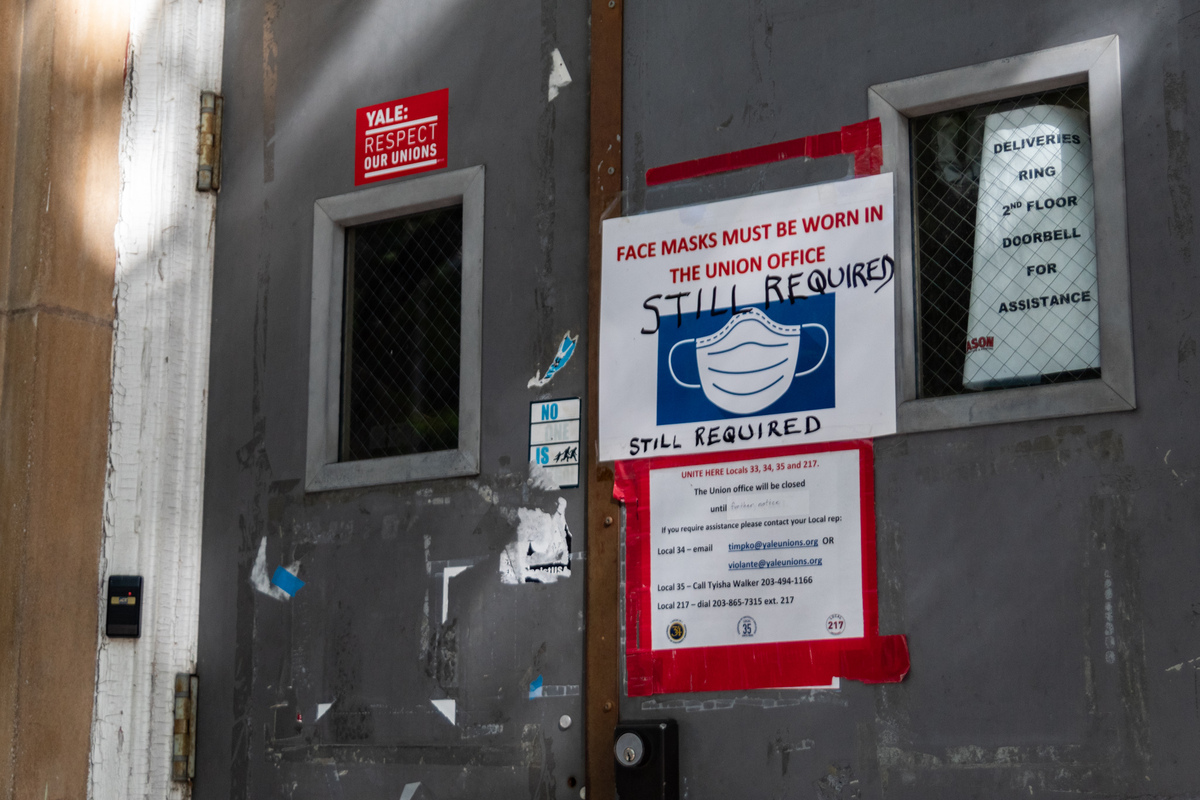Three years in: The state of the COVID-19 pandemic in New Haven
After a lull in COVID-19 numbers, New Haven has witnessed a January upsurge in positive cases — including in its own mayor.

Zoe Berg, Photo Editor
On Jan. 24, Mayor Justin Elicker announced on Twitter that he had tested positive for COVID-19, drawing attention to the state of the pandemic in New Haven in its third year.
Mayor Elicker’s sickness reveals the continued transmission of COVID-19 around New Haven, three years after the pandemic first struck the city in 2020. After a plateau in cases toward the end of 2022, the winter months have witnessed a resurgence in positive cases — on average, about 30 cases have been confirmed each day of January and February so far, compared to around 15 daily cases in November and December.
Along with the positive cases, there has also been an upsurge in hospitalizations related to COVID-19. On Oct. 7, 2022, there were 54 hospital in-patients with COVID-19. Three months later, on Jan. 5, 2023, that number jumped to 164.
Elicker confirmed that he would be working from home following the news, using his Twitter to promote vaccination efforts and remind residents of CDC protocol.
“I appreciate everyone’s well wishes,” he wrote on Twitter. “I’m also thankful that my family and I are fully vaccinated and boosted, and I encourage residents to keep up to date with their vaccinations as well.”
Rather than being able to quarantine at home, more individuals are being admitted to Yale-New Haven Hospital, whether in the intensive care unit or another in-house site, for treatment. January 2023 has seen the highest number of COVID-19 in-patient admissions per month in an entire year.
“Some illnesses, which weren’t as much a problem before, are being exacerbated,” Cunningham told the News.
Cunningham also recalled accounts of nurse co-workers who can no longer care for bedside patients due to their own cases of long COVID.
Healthcare workers also noted that many admitted patients do not realize they have COVID-19 until they are tested at the hospital. Cynthia Sparer, senior vice president of operations at Yale-New Haven Hospital, pointed to the importance of continued testing and following the CDC guidelines introduced at the beginning of the pandemic outbreak.
“We continue to see patients here in our emergency departments within our inpatient units who are positive for COVID,” Sparer said. “Some of them are here for other healthcare reasons, and via testing, we find that they had COVID and were unaware of it.”
Public health officials have stressed the importance of health literacy and home-testing around the new year. Over the previous year’s holiday break, while individuals were vacationing for the holidays or students were returning to school, Bo Sandine — public educator with the New Haven Health Department — recalled how the city’s Department of Emergency Operations distributed approximately 8,000 COVID-19 at-home tests.
Although the Department of Emergency Operations will not be distributing test kits this year, Sandine plans to conduct a similar campaign with the New Haven Health Department.
“[We] were just able to purchase additional test kits from our health literacy grant to hand out to residents during outreach and at community events this year, as supplies last,” Sandine told the News. “We estimate that we will be able to purchase and distribute around 10,000 kits with this funding.”
Sandine also called attention to the fact that the pandemic is not over, citing low vaccination rates and high mortality rates. According to Sandine and the New Haven COVID-19 Hub, while 78 percent of residents have received their first vaccine, 69 percent are fully vaccinated, and only 37 percent have received any additional dose. Aside from continuing to champion vaccination, he emphasized the need to remain mindful of CDC protocol.
“We do need to accept that COVID-19 is not going anywhere,” he wrote. “As a community we need to continue being vigilant: practicing mitigation strategies, getting vaccinated, and staying home when sick.
Over 42,000 confirmed cases of COVID-19 have been reported in New Haven as of Jan. 26, 2023.
Correction 2/7: A previous version of this article misstated the name of the hospital at which Dale Cunningham works.







